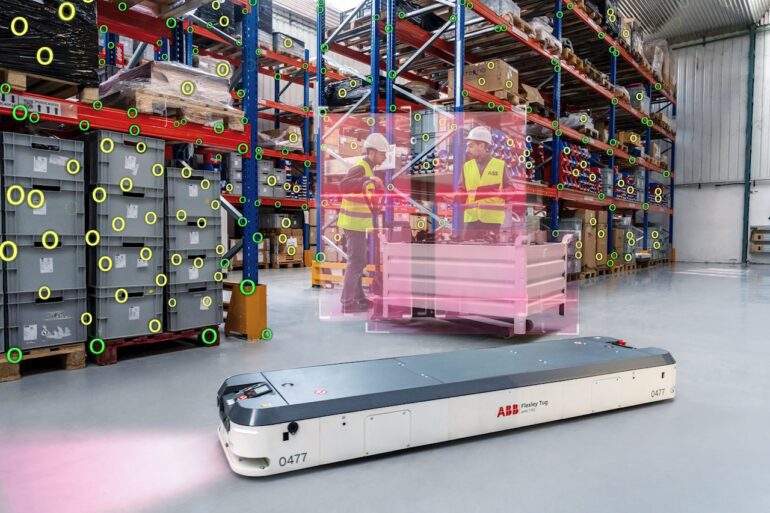TL;DR:
- ABB acquires Swiss start-up Sevensense, known for AI-enabled 3D vision navigation technology for autonomous mobile robots (AMRs).
- This move aligns with ABB’s vision of AI-enabled robots collaborating with humans to address labor shortages.
- Sevensense’s technology will be integrated into ABB’s AMR portfolio, promising increased speed, accuracy, and payload capacity.
- The mobile robot market is expected to grow at a 20% CAGR through 2026, and ABB’s AI-powered 3D vision tech is poised to lead this growth.
- Sevensense’s navigation tech combines AI and 3D vision, allowing AMRs to navigate complex environments autonomously.
- Automotive manufacturing and logistics are already benefiting from this technology, with applications in Ford and Michelin facilities.
- ABB aims to transition from linear production lines to dynamic networks, with AMRs collaborating safely with humans.
- Sevensense’s technology has broad applications beyond AMRs in areas like material handling and service robotics.
- The partnership underscores ABB’s commitment to innovation, nurturing the next generation of technologies.
Main AI News:
In a strategic move aimed at solidifying its leadership position in next-generation AI-enabled mobile robotics, ABB recently announced the acquisition of Sevensense, a Swiss start-up renowned for its cutting-edge AI-enabled 3D vision navigation technology tailored for autonomous mobile robots (AMRs). Established in 2018 as a spin-off from Switzerland’s prestigious technical institution, ETH Zurich, Sevensense has been at the forefront of pioneering advancements in robotic navigation.
The acquisition comes as a significant step toward ABB’s vision of creating a workplace where AI-powered robots seamlessly collaborate with human workers, a development poised to address the growing need for greater flexibility and intelligence in the face of skilled labor shortages. Sami Atiya, President of ABB Robotics and Discrete Automation, highlighted the potential of this technology, stating, “Each mobile robot, equipped with vision and AI, scans a unique part of the building; collectively these robots complement each other’s view to form a complete map, enabling them to work autonomously in a rapidly changing environment.”
ABB’s journey with Sevensense began in 2021 when the company made a minority investment in the start-up, subsequently joining its innovation ecosystem. This strategic move was followed by ABB’s acquisition of ASTI Mobile Robotics. While the financial details of the transaction remain undisclosed, ABB plans to integrate Sevensense’s technology into its AMR portfolio, offering an unparalleled combination of speed, accuracy, and payload.
Market analysts predict robust growth in the mobile robotics sector, with a projected 20 percent compound annual growth rate (CAGR) through 2026, escalating from $5.5 billion to $9.5 billion. ABB’s AI-powered 3D vision technology is poised to play a pivotal role in driving this growth.
Sevensense’s groundbreaking navigation technology is a fusion of AI and 3D vision, empowering AMRs to make intelligent decisions by distinguishing between fixed and mobile objects in dynamic environments. These mobile robots, equipped with Visual Simultaneous Localization and Mapping (Visual SLAM) technology, create and continuously update maps, enabling them to operate autonomously in complex environments alongside human counterparts. This innovation drastically reduces commissioning time, enhancing operational efficiency without disruption.
Already, this AI-enabled navigation technology is revolutionizing automotive manufacturing and logistics, enhancing efficiency and productivity. Ford, for instance, will leverage Visual SLAM-enabled ABB AMRs in its US production sites, while Michelin plans to deploy this technology in intralogistics at its Spanish factory. Other automotive manufacturers are set to follow suit in the UK, Finland, and Germany.
Marc Segura, President of ABB’s Robotics Division, emphasized the transformative impact of this technology, stating, “Offering more autonomy and cognitive intelligence, ABB’s unique market-proven technology paves the way for a shift from linear production lines to dynamic networks. Intelligent AMRs autonomously navigate to production cells, tracking stock inventory as they go and sharing this information with other robots, while collaborating safely side-by-side with humans.”
With the addition of Sevensense, ABB positions itself as a leader in next-generation AMRs, offering Visual SLAM in Autonomous Mobile Robots alongside an integrated portfolio covering robots and machine automation solutions, all managed by its value-creating software.
Gregory Hitz, CEO of Sevensense, expressed excitement about the partnership, stating, “This is a significant moment in our shared journey, as we introduce our home-grown technology to a wider range of markets and sectors. ABB is the ideal home for us to continue scaling our versatile platform for 3D visual autonomy, serving OEMs across the automated material handling and service robotics industries. Together, we will redefine the limits of AI-enabled robotics.”
The implications of this revolutionary technology extend beyond AMRs, promising greater efficiency, flexibility, and precision throughout production and intralogistics. The technology will also continue to be accessible across various segments, including material handling, cleaning, and other service robotics fields, under the product name Sevensense.
The Sevensense acquisition exemplifies ABB’s commitment to nurturing the next generation of innovations. Through its partner ecosystem and collaboration with start-ups and universities, ABB is consistently pushing the boundaries of technology for the benefit of global businesses. Approximately 35 employees of Sevensense will continue to operate from its Swiss office in Zurich, ensuring continuity in their groundbreaking work.

Source: ABB
Conclusion:
ABB’s acquisition of Sevensense positions the company as a leader in AI-enabled mobile robotics, with potential applications spanning various industries. This strategic move aligns with the growing market demand for flexible and intelligent robotics solutions, positioning ABB to capitalize on the anticipated 20% CAGR growth in the mobile robot sector through 2026.

